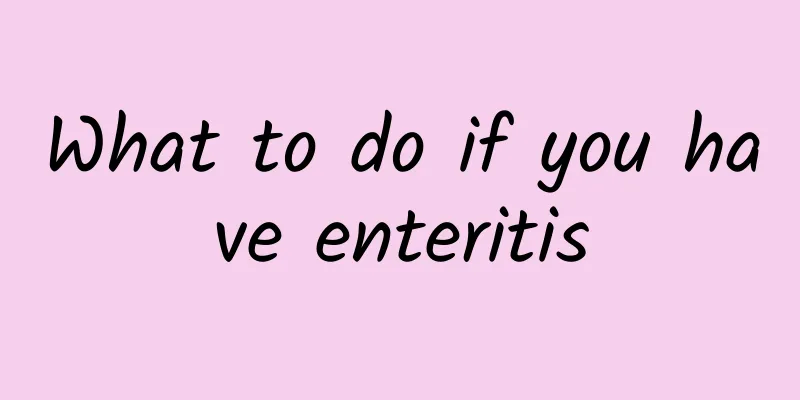What to do if you have enteritis

|
Enteritis is a very common disease. This type of disease must be treated in time after it occurs, otherwise it will cause more harm to the body. The common treatment for enteritis is drugs. Drugs are very helpful in controlling enteritis. Moreover, it takes a while to treat such a disease, so patients also need to pay attention. Patients with severe enteritis also need to choose other treatment methods. What should I do if I have enteritis?
There are good solutions to what to do if you have enteritis, but when treating such a disease, the patient also needs to actively cooperate. When treating enteritis, the patient must also pay attention to his or her own condition. If you are seriously uncomfortable in your body, you must improve it in time. What to do if you have enteritis: 1. Pathogen treatment Viral enteritis generally does not require pathogen treatment and can heal on its own. For bacterial enteritis, it is best to select antibiotics based on the results of bacterial drug sensitivity tests. When suffering from bacillary dysentery, because Shigella dysenteriae is widely resistant to commonly used antibiotics, co-trimoxazole (cotrimoxazole), pipemidic acid, gentamicin, amikacin, etc. can generally be used. Campylobacter jejuni enteritis can be treated with erythromycin, gentamicin, chloramphenicol, etc. Yersinia enterocolitica enteritis is generally treated with gentamicin, kanamycin, co-sulfamethoxazole, tetracycline, chloramphenicol, etc. Patients with mild Salmonella enteritis may not need antibiotics, while patients with severe cases can use chloramphenicol or trimethoprim-sulfamethoxazole. Invasive Escherichia coli enteritis can be treated with neomycin, colistin and gentamicin with good results. Amoebic dysentery, enteritis caused by Giardia lamblia and Trichomonas can be treated with metronidazole (Flagyl). Schistosomiasis can be treated with praziquantel. Oral nystatin is effective in treating Candida albicans enteritis. Patients with systemic fungal infection need to be treated with amphotericin B. 2. Symptomatic treatment Replenish fluids and correct electrolyte and acidosis. For those who are mildly dehydrated and do not vomit severely, oral rehydration can be given. The WHO-recommended oral rehydration formula is sodium chloride, sodium bicarbonate, potassium chloride, glucose or sucrose, plus water. For patients with severe dehydration or vomiting, normal saline, isotonic sodium bicarbonate and potassium chloride solutions, and glucose can be given intravenously. Drugs that reduce intestinal motility and secretion. Atropine, belladonna, and propantheline can be used in small amounts to reduce intestinal motility, relieve pain, and stop diarrhea. Chlorpromazine can also be used. It has a sedative effect and can inhibit excessive secretion of intestinal mucosa caused by enterotoxins, thereby reducing the frequency and amount of bowel movements. The above is a detailed introduction on what to do if you have enteritis. When enteritis occurs, you can completely follow the above methods. However, when improving enteritis, you must also pay attention to your diet and not eat casually. This will not do any good to the body. This is also something that needs attention. |
<<: Can I get pregnant if I have gynecological diseases?
>>: Common diseases in children
Recommend
Is regular cupping good for your health?
There are many ways to maintain health, and cuppi...
What are the severe symptoms of uterine cold?
A woman's uterus is a very important organ wh...
What should I do if my vagina is not clean?
Poor vaginal cleanliness indicates that it is cau...
Is sweat steaming effective for weight loss and beauty?
Beauty and slimming seem to be the goals pursued ...
Can onion and vinegar remove formaldehyde?
Nowadays, more and more people are buying houses....
Is cerebellar atrophy hereditary?
Cerebellar atrophy is a very scary disease, and i...
What kinds of Rehmannia pills are there?
The “Dihuang Pill” family is huge, and Liuwei Dih...
Can sebaceous cysts be squeezed out by themselves?
Sebaceous cyst is commonly known as cyst, which i...
Why does my ears hurt when I move my mouth?
Most people will encounter some special situation...
Does the rash of roseola infantum itch?
Emergency treatment for young children is quite c...
What diseases can cause fecal odor and bad breath?
Bad breath is a symptom that can be compared to b...
Lower eyelid pimples that don't hurt or itch
Many people have experienced the phenomenon of pa...
Hot palms and soles
Many people are more concerned about the common c...
What are the wrong ways to clean your teeth?
Having white teeth can make people more confident...
What is the reason for female urethral polyps?
In real life, polyps in the female urethra are a ...









